-
American Goldfinch (1)
-
American Robin (1)
-
Baltimore Oriole (1)
-
Blue Jay (1)
-
Bluebirds (1)
-
Carolina Wren (1)
-
Chickadee (1)
-
Ducks (1)
-
Starling and House Sparrow (1)
-
House Finch (1)
-
House Wren (1)
-
Hummingbirds (5)
-
Northern Cardinal (1)
-
Northern Mockingbird (1)
-
Nuthatch (1)
-
Owls (3)
-
Tufted Titmouse (1)
-
Woodpeckers (6)
Squirrel Proofing Your Bird Feeders - A How-To Guide
Yes, unfortunately it’s a real thing. Squirrels like bird seed! Not only that, but they are also smart and very acrobatic - not to mention mischievous! How in the heck am I going to deal with this situation? Many backyard bird feeding enthusiasts have been asking this same question for years. There are many ways to discourage them, but very few are 100% effective in keeping them off your bird feeders.
We’re going to explore some available options and discuss each one. While you may not be able to keep the squirrels off your bird feeders 100% of the time, you can at least try to frustrate them as much as they are frustrating you.
If you can’t beat ‘em, join ‘em! The simplest approach can sometimes be the best answer. If squirrels are eating your bird seed, why not feed them something they like in a different location? If your yard is large enough to accommodate this notion, try placing some squirrel food in an area as far from your bird feeders as possible. Perhaps offer them some peanuts or corn. Playing nice in the sandbox with your backyard squirrels by giving them a squirrel food option might help keep them off your bird feeders.
Put your existing feeder in a cage. If you have feeders that you really like and you’re not sure whether or not you’re ready to invest in a fancy new squirrel-proof bird feeder, there is an option for you. There are universal cages out on the market today that are made to house an existing feeder. The cage shown on the left is offered in 2 different sizes; one is taller than the other. Not all feeders will fit into these, but if you use tube feeders, these may be something to consider.
The cage on the right is designed to go around a seed cylinder feeder and seed cylinder. If you use seed cylinders to feed birds, this cage presents a great option to enclose your cylinder.
There are a couple of drawbacks to these cages. First of all, if the openings in the cage are small enough to keep squirrels out, they may also prevent larger birds from getting to the seed. Birds like the Red-bellied Woodpecker or even the Northern Cardinal may not be comfortable going inside the cage to eat at the feeder. The cages are also a little clunky or cumbersome to use. In the case of the seed cylinder cage, you have to completely remove the feeder from the cage to replace the seed cylinder.
Use a squirrel-proof baffle if your feeder is mounted to a pole. If you use a pole or a pole system in your yard, you may want to consider adding a baffle. Shown below are 2 different baffle options. The baffle on the left is an inline, torpedo-like baffle. This patented Squirrel Stopper spring loaded baffle is a great way to keep squirrels from climbing up your pole. When properly mounted and with your pole situated a safe “squirrel distance” from a jumping off point, this baffle will prevent squirrels from accessing your feeder by climbing up the pole.
If your pole is stuck in the ground and you have no way to get this baffle mounted, or if you’re using a shepherd’s hook with a curved hanger at the top, then a wrap-around baffle might be a good choice (pictured on the right below). This baffle breaks apart so you can wrap it around your pole, then snap it back together. There is an included bracket which you attach to the pole and the baffle rests on top of it.

Purchase a pole or pole system with a baffle. If your feeder is not on a pole, you may want to consider this option. Squirrel Stopper and JCs Wildlife have some great pole systems. The Universal Pole Kit comes without a baffle, but one can be purchased separately. The Denali pole system comes with a baffle and a universal mounting bracket. The Sequoia comes with a baffle, as well as hangers for your feeders. Lastly, if you’re looking for something beefy, the Deluxe pole system is the right choice for you. This system sports a 2” diameter pole and can hold up to 30lbs. When properly installed, the Squirrel Stopper systems will do just that, stop the squirrels from getting to your bird feeders. Squirrel Stopper pole systems can be found on the JCs Wildlife website here.
SHOP SQUIRREL STOPPER POLE SYSTEMS

Invest in a squirrel proof bird feeder. There are several options on the market that advertise being squirrel proof or squirrel resistant. There are typically one of two squirrel stopping technologies in use with these feeders - weight sensitive or caged. We spoke earlier about a cage you can buy to fit around a bird feeder. Some bird feeders are actually made with a cage already in place that is used to stop squirrels. JCs Wildlife offers a couple of caged feeder options that are designed to keep squirrels away from suet or seed cakes - which squirrels tend to love. These can be found here, and are pictured below.
SHOP SQUIRREL STOPPER SUET FEEDERS

The other squirrel proof feeder option uses a weight-sensitive method to keep squirrels out of your bird seed. The premise is that when a bird lands on the feeding perch, it can eat with no problem. But if a squirrel tries to access the food, its own weight works against him, closing off the feeding port. Perhaps the most popular brand name using this technology is Brome. Brome also guarantees their feeders and offers a wide assortment of replacement parts if needed. Brome feeders can be found at JCs Wildlife here:
SHOP BROME FEEDERS

Here is another choice when it comes to squirrel proof feeders. The Woodlink Absolute feeder series have been around for years. These feeders use a similar weight sensitive approach to that of Brome. They can be found HERE at JCs Wildlife.
Use Hot Pepper food products. This can be a great option to consider if you want to keep squirrels from eating your bird food, but would rather not use a squirrel proof feeder or try to squirrel proof your existing feeder. Squirrels are mammals; and like most mammals, they are susceptible to and perceptive of the heat that comes with eating hot peppers. Make it hot enough, and they’ll turn tail and scamper away from your feeder, never to return again. These products use some form of hot pepper (cayenne, jalapeno, habanero, etc.) sauce or powder to coat the food, or in the case of suet, incorporate into the food. Birds don’t mind. They do not have the taste receptors in their mouths to feel the heat. And the hot pepper is not harmful to them.
Probably the most popular food in this line of products is the seed cylinder, followed by suet cakes, seed cakes and even bags of loose seed. Mr. Bird makes a Flaming Hot Feast seed cylinder (large and small), hanging bell and loose seed. Other companies like Cole’s and Pine Tree Farms make hot suet and other loose seed options. There is also a Cole’s hot liquid product you can purchase in a bottle and mix into your loose seed. As with any hot pepper product, you must exercise caution when handling any of these bird food items. This stuff is hot, sometimes very hot. You don’t want to get it in your eyes.
All of the hot pepper seed offerings at JCs Wildlife can be found HERE.

Try using Safflower bird seed. Squirrels don’t particularly care for Safflower seeds. It is said to taste bitter to mammals, so they tend to avoid it. So why can’t I just feed nothing but Safflower to my backyard birds? Well, as with most things, Safflower has its good points and a few on the negative side of the pendulum. Here’s a quick summary of the pros and cons when using Safflower seed.
Pros:
- For its small size, it packs a punch! It is very high in proteins and fatty acids.
- It not only deters squirrels, but bully birds like starlings and grackles tend to avoid it. The small shell size makes it difficult for them to crack and eat with their beak structures.
- Small songbirds love it! Cardinals, house finch, chickadees and titmice will readily eat it.
Cons:
- It’s a messy seed. The small white shells can make a mess under your feeder.
- Birds like woodpeckers do not typically eat it.
- It’s more expensive than Black Oil Sunflower seeds.

Landscaping to discourage squirrels: If your bird feeders are in your landscaping you may want to try a couple of things. Squirrels tend to not like mulch - especially fresh mulch. Maybe it’s the smell? Some say the smell of fresh mulch might mask the smell of the things the squirrels are attracted to. Also, squirrels like to dig in the dirt, walk in the dirt, etc. They don’t particularly like the feel of mulch.
Squirrels also tend to shy away from allium plants. Some common ones in this family are daffodils and hyacinths. If you have some of these flowers and mulch around your feeder, it might just be enough to send the squirrels packing.

Try out some natural sprays to deter squirrels. Some people have had good luck using apple cider vinegar around their feeders. Others say garlic can keep them away. Yet another possibility is to mix up a hot pepper liquid spray. Just remember that using sprays is not a long term fix. The odors can become diluted over a short period of time or the spray can be washed away in the rain. If this works for you, it’s something you would need to stay on top of.
Don’t care for sprays, how about sprinkles? In the same fashion as the spray option, perhaps try putting some hot pepper products on the ground around your bird feeders. Hot pepper flakes or other types of ground hot peppers. People have also reported having luck using coffee grounds. Just keep in mind that much like the sprays, these sprinkles will also fade or wash away in time. They would need to be reapplied regularly to be effective.

Hopefully you found some of this information helpful. Please remember, squirrels are crafty and mischievous creatures - and nothing in nature is usually 100%. Most of the squirrel proofing-deterring-discouraging-thwarting methods listed here are not guaranteed to work for everyone. Tthe Squirrel Stopper Pole Systems discussed earlier and sold by JCs Wildlife are very effective if used properly. JCs Wildlife has never had a customer say that a squirrel beat one - again, if used the way they are intended.
Just one more quick thing to discuss when talking about squirrels…
- Please do not harm your squirrels.
- Please, please do not attempt to trap squirrels.
- And please, please, please do not use Vaseline or any other type of grease or oil on your bird feeders or poles. This can potentially cause harm to your backyard birds.
Practice responsible backyard birding and have fun!
No comments
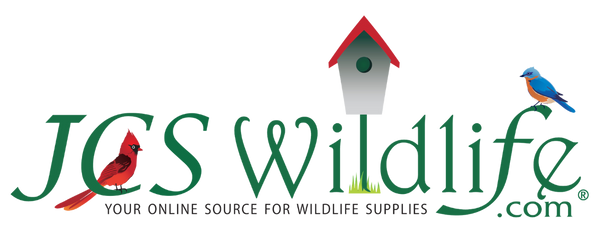
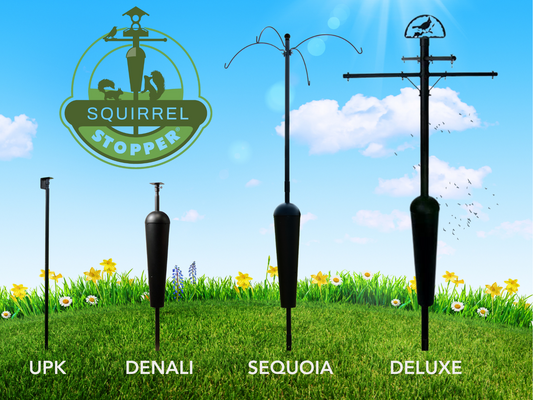
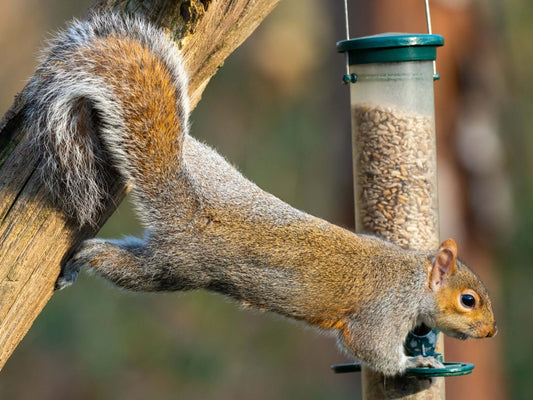
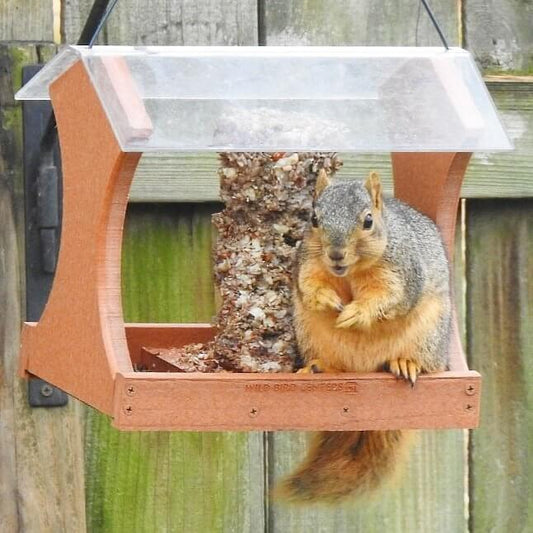
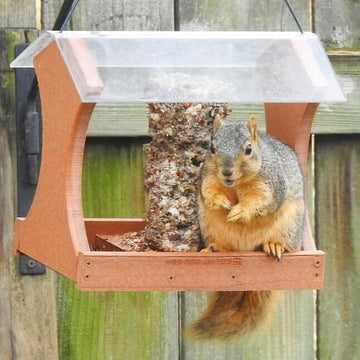
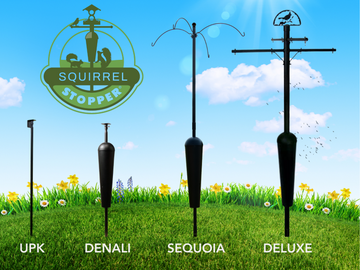

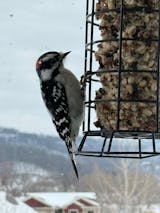
0 comments